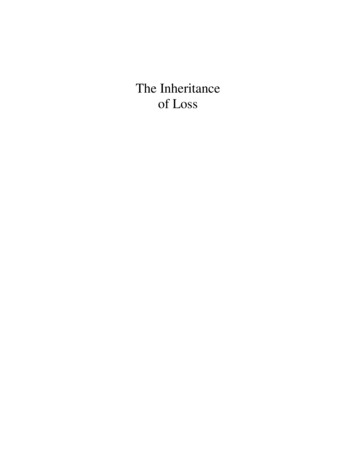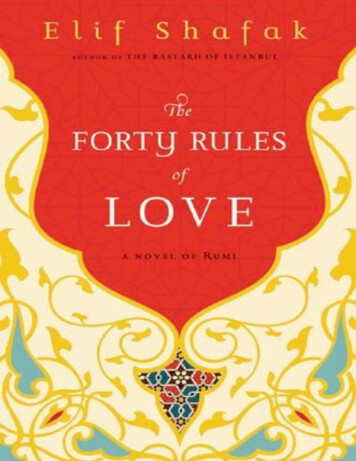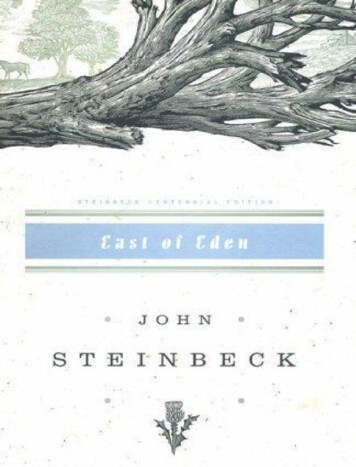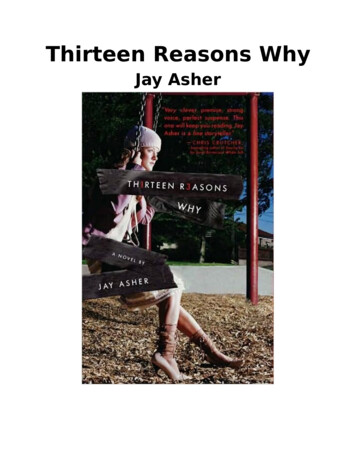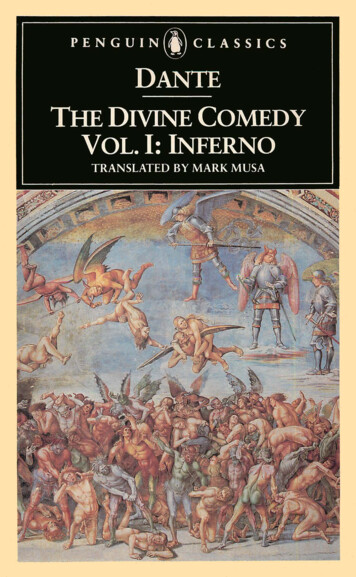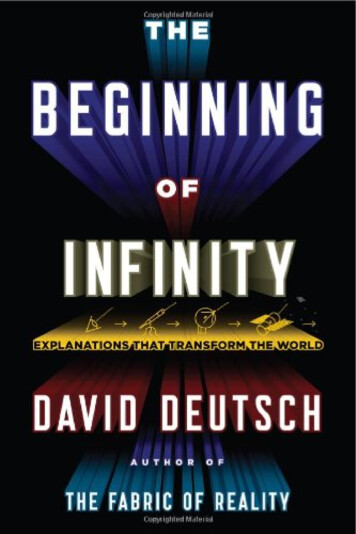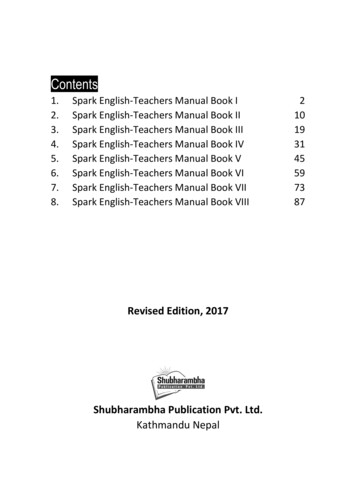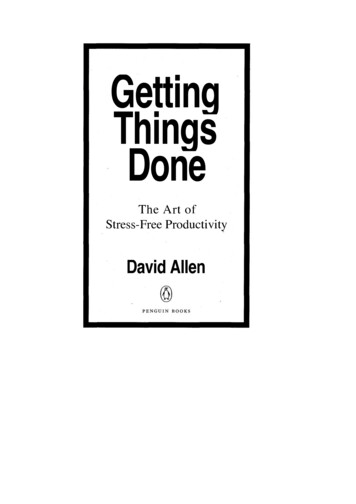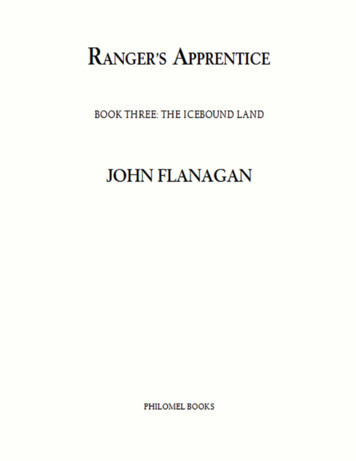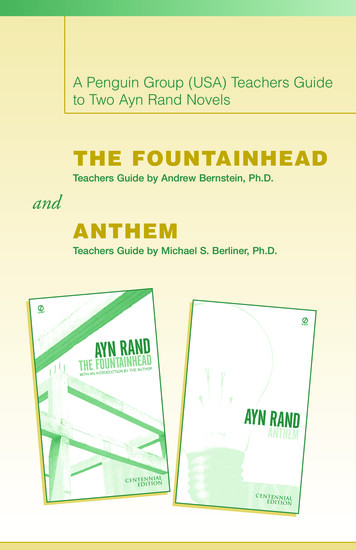
Transcription
TEACHERS’ RESOURCESRECOMMENDED FORUpper primary and lower secondary(ages 9–12)CONTENTS1.2.3.4.5.6.7.8.Plot summaryAbout the authorThemesCharacterStructure, style and symbolsIssues for explorationWriting activitiesFurther exploration12233456THEMES ConflictSurvivalFamilyDifferent culturesPowerlessnessPREPARED BYPenguin Random House Australia and AndreaBlakePUBLICATION DETAILSISBN: 9780141308388 (paperback);9781742283722 (ebook)These notes may be reproduced free ofcharge for use and study within schools butthey may not be reproduced (either in wholeor in part) and offered for commercial sale.Visit penguin.com.au/teachers to find out howour fantastic Penguin Random House Australiabooks can be used in the classroom, sign up tothe teachers’ newsletter and follow us on@penguinteachers.Copyright Penguin Random House Australia2016Boy OverboardMorris GleitzmanPLOT SUMMARY‘Overboard,’ says Yusuf’s grandfather, ‘is anEnglish word meaning to do something that is bold,wild, dangerous and crazy.’Jamal’s decision to ‘go overboard’ stems from hisexperiences growing up in a war-torn land. Hewants to change his world and he has a grandplan. His passion for soccer will be the means toturn around his government, his country, and lifefor his family.But Jamal is about to embark upon an adventuremore ‘bold, wild, dangerous and crazy’ than hecould ever imagine. In reality, it is far from anadventure.A young boy facing the unknown and dealing withincredible adversity does give the story an edge ofexcitement and suspense as a true adventurewould. But for Jamal and his family who are thrustinto a terrible situation, there is no such thing asreal choice. In terms of power and control, theyhave none – over the battered vessels that takethem to sea nor the cruel smugglers who treatthem appallingly. They risk everything and havegiven up everything – for what? There’s noguarantee of safe delivery. No knowledge of theirfate. Just a hope that an unknown country –Australia – will be a haven.Separated from their parents at the docks, Jamaland Bibi do not even know if they will see their
Boy Overboard Morris GleitzmanMum and Dad again – a haunting nightmare asthey try to cope with the hazards and traumas oflife on a refugee boat. What they do have controlover is attitude and spirit. Jamal’s narration of thetale highlights his incredible strength – be it drawnfrom his knowledge of his ancestors or his belief inthe ‘secret of soccer’ – ‘never give up, even whenthings are looking hopeless’.Optimism, perseverance, courage and tenacity arethe tools of survival for Jamal, his feisty youngersister Bibi and the friends they make on theirjourney, Rashida and Omar. These things,together with a rich fantasy life focussed on soccerand how great Australia is going to be, sustainJamal through horrendous and heart-breakingexperiences.One question Morris Gleitzman leaves unansweredis whether Jamal’s faith and hope will be rewarded.After all Jamal and his family go through, will theybe recognised and welcomed? Just how‘overboard’ does a boy have to go?ABOUT THE AUTHORMorris Gleitzman grew up in England and came toAustralia when he was sixteen. After university heworked for ten years as a screenwriter. Then hehad a wonderful experience. He wrote a novel foryoung people. Now, after 38 books, he's one ofAustralia's most popular children's authors.THEMESThere are many significant themes running throughthe story. Encourage students to identify recurringthemes, finding and synthesising collectedexamples from the text. Select pertinent quotes toflesh out the themes and generate discussionabout Morris Gleitzman’s writing. Examples ofrelevant quotes and sub-themes to exploreaccompany the small selection of themes listedbelow. Use as starting points or build further.ConflictOur people are not liked by many of the otherpeople in this country. This has been going on forhundreds of years The problems of our peopleare very serious. They started long before thisgovernment. (p42) The history of conflict in Afghanistan – internalissues over time as well as contemporaryproblems.SurvivalFor the millionth time since we set sail, I remindmyself why we’re doing this. Freezing on a harddeck all night. Roasting all day. Watching poor littlechildren and old people suffer even more than us.Australia. Laughing people. A kind government.Mum and Dad and Dubbo Abattoirs United. (p130)Questions What keeps people going – in this situation andin others? What effect does stress have on people andhow do different personalities cope? What aspects do we have control over and howcan we best use these?Bonds of familyI remember what Mum told me about herancestors. Fierce brave desert warriors, tall andproud in the saddles of their mighty Arab steeds.She also told me about Dad’s ancestors, honesthard-working bakers, baking bread so that thosefierce warriors had something to mop up theirgravy. (p12)Consider Importance of ancestry – knowing who andwhere you’ve come from, sense of familyhistory and a place to belong. Relationships in this story – between Bibi andJamal, Mum and Dad, parents and children;how friendships are forged in times of adversity. Putting your needs last and others first.Different worlds and culturesNine-year-old kids shouldn’t hate their country.They should love their country and want it to dowell in the World Cup and earn the respect of othernations so they’ll stop bombing us. (p23)Consider Clashes between what you want to believe,should believe and have to believe.Consider Notions of freedom and independence. Conflict between people in general – closer tohome, situations with family and friends. Things which influence and underpin culturalbeliefs and expressions. Political and social conflict – inhabitants ofcountries/land and governing bodies, factionsand interest groups within governments and/orcommunities.Power and powerlessnessIf a person gets really good at soccer, so good thathe inspires the government to start a national teamand do really well in the World Cup, do you thinkThere’s so much more atpenguin.com.au/teachers2
Boy Overboard Morris Gleitzmanthe government would stop being cross with thatperson’s parents even if that person’s parents hadbeen running an illegal school? (p40)o What is important to this character?Consider Ways of using influence for good and for bad.o How would you describe his/hertemperament? Emotions engendered by having or lackingpower.o What coping strategies does this characteremploy and do they work? Power within (attitude), living with rules orconditions imposed by others.o Reflect on this character’s actions in thestory. Write about how you feel towardshim/her and why you think this characterelicits such a response.CHARACTERThe characters in Boy Overboard are strong, multidimensional and entirely believable. The majorplayers, Jamal and Bibi, their parents and theirnew friends Rashida and Omar all exhibit strengthsand weaknesses that drive and add to the action.Together with Andrew (a member of the AustralianDefence Force who embodies all that is positiveand endearing about ‘Australians’), they comprisethe ‘goodies’ in a story where ‘baddies’ aredistinctly marked by their abhorrent behaviour. Thepeople-smugglers and pirates, and the haplesssailors, personify evil with their completedisrespect for the value of human life and theircallous indifference to the plight of the refugees.Morris Gleitzman has created characters that lendthemselves to analysis. Central players each havegifts as well as flaws. While most peopledemonstrate different sides to their personalities, afew characters exhibit only the worst of humanfrailties.Encourage students to look beyond the actionsand words of the characters and probe intomotives and psychology – why do people do thethings they do?Activities Identify characters in categories of good andbad (or other designated headings)o How do we determine who goes where?o Find examples of action, words orbehaviour that support the selectioncriteria.o Do you have anything in common withhim/her? Consider the relationships between characters.On the refugee boat, the characters are quiteliterally thrown together. Each person impactsupon others and brings something unique andof value. Evaluate Jamal, Bibi, Rashida, Omarand Andrew in terms of what each has to offer.o What ability, talent or skill can each makeuse of?o Find examples of these things and howthey were used to influence or change asituation for others. Write down three words that spring to mindwhen asked to describe qualities the followingcharacters have: Jamal, Mum, Dad, Bibi, OmarSTRUCTURE, STYLE ANDSYMBOLSMorris Gleitzman brings his novel to life using arange of techniques and interesting story elements.You may wish to explore aspects of his writingstyle by discussing the notes below. His novel isalso an excellent model for students’ own writing.Use it to develop their repertoires of techniques,experimenting with the elements Morris Gleitzmanuses to such great effect.StructureA chronological sequence of events narrated bythe central character as they unfoldo What is the choice made up of? (ie:options, lesser of two evils, pros and cons)The pace is fast and the story is completely‘gripping’ in the sense that the action is continuous– and continually disastrous. Just when it seemsthings cannot get worse, they do. Each chapterintroduces fresh challenge or potential catastropheso that the reader is swept along with the actionand suspense.o What do they choose to do and why?Questionso How does this decision impact upon theindividual and those around him/her? How did you feel while reading this story? Select four different characters from the storyand analyse the choices they make. List each of the main characters and answer thefollowing questions: How does Morris Gleitzman retain the interestof the reader?There’s so much more atpenguin.com.au/teachers3
Boy Overboard Morris GleitzmanStyleNarrative, told in first person.Gleitzman has ensured the appeal of this story to abroad audience by creating characters andsymbols to which both sexes will be drawn.Questions What difference does the perspective fromwhich the story is told make? What if Bibi had told the story, or an adult? Inyour opinion, would it work?HumourQuestions How does Morris Gleitzman make use ofcomedy in a situation that is so grave andserious? Do you like the humour in the story? Whateffect do you think it has?SymbolQuestionsSport, particularly soccer, plays a key role in thisstory. Jamal’s fantasies about playing soccer givehim all sorts of positive feelings – hope, optimism,ambition, enjoyment. What does he have, in fact,to support his love of soccer? No equipment, noplaying fields, not many fully able players and agovernment that doesn’t allow the sport in the firstplace! Contrast that with Jamal’s sense of thepower of sport – bringing people together, fameand celebrity that equates with success andfreedom.Questions What power does it have? (eg: helping to forgetproblems, team building – inclusive, in realitysaves as well as endangers them often) Why are sporting heroes/identities soimportant? Why are the children deprived of sport? What does Jamal get out of his love for soccer? Follow the life of the soccer ball – where does itgo? What problems does it cause? What issignificant about the fact that it completes thejourney with Jamal? Who does it bring intoJamal’s life?While this strong symbolism of sport will make thestory especially appealing to boys, Bibi ensuresthat girls are not left out! Her passion for the sportis matched by her amazing skill – amazingconsidering playing soccer can be a lifethreatening crime in her country! Bibi is a verystrong female character – almost too willing tostand up to challenge. She vents frustration readilyto the point of exhibiting much greater aggressionthan most of the other characters. MorrisISSUES FOR EXPLORATIONEmotionEvery page in this story yields evidence ofemotion. The characters experience deep, strongfeelings and are often involved in situations thattake them to the extremes of very powerfulemotion. Grief, despair, anxiety, joy, depression,frustration – all are intensely felt at one point oranother. Simply tracing the experiences of onechosen character and listing the emotions he orshe reveals is a very worthwhile activity. Byskimming over the story to do this, significantissues are brought to light and these will generatemuch discussion and reflection. Find examples anddraw on dialogue from the text to illustrate emotion– for example on page 172: ‘I can’t move. I’mparalysed with relief and joy.’Jamal’s emotions are thrown into chaos as hecomes to terms with the reality that his parents arealive having mourned them as dead the last 24hours! Ask your students to put themselves in theplace or the shoes of one of the characters. Utilisedramatic techniques such as role-play, interview,speech and soliloquy to realise and delve intothese emotional depths.ResponsibilityWho takes responsibility in Boy Overboard for thesituation the characters find themselves in? Howdoes the weight of responsibility affect Jamal andhis parents? Whose responsibility are the problems– in their home country of Afghanistan, at sea inthe hands of smugglers and in a new countryreluctant to take them in? Are the adults behavingresponsibly? Are the children? Is the responsibilityshared or does it fall to one person/one group/onesection of society/ one government?ChallengeWhat challenges are faced by each individual –from farewelling their homeland to the shores of anew land? And what of the wider circle of peopleaffected by the lives of the central characters –family, new friends, other refugees on board theboat, countrymen and women left behind, people ina new country and community? Focus on thechallenges faced by refugees such as Jamal andhis family when they do make it ashore. If Australiatakes them in, what will happen to them? Whatfurther challenges must be faced before thefreedom and happiness they long for might beachieved?There’s so much more atpenguin.com.au/teachers4
Boy Overboard Morris GleitzmanConnectionsFocus on the candlestick that is so treasured byJamal’s family. Explore why it is meaningful andsymbolic for them. Discuss the connections peoplefeel with their ancestors, feelings of having a place,belonging somewhere or to someone. Ask thestudents to consider the judgements andassumptions others make about things that aremeaningful to them. Share thoughts about thedifferent cultural values, heritage, symbols andrituals that bring meaning to peoples’ lives.ContrastsThere is evidence of all of these things – crueltyand violence but also hope and optimism; injusticeand abuse but also kindness and fair play;frustration and suspicion but also trust andpersonal growth. For many of the negatives, apositive can be found to strike some sort ofbalance. The perception of ‘balance’ in oneperson’s eyes, may not equate to evenness toanother – it is all relative, especially to thecharacters experiencing life as they do in this story.Explore these contrasts. Is it possible to work outwhose side different characters are on? Againstsuch a rugged background, Jamal’s philosophyabout what is important in life is starkly simple.The Role of Girls and WomenBibi must have forgotten that girls aren’t allowed toleave the house without a parent. She must haveforgotten that females have to keep their facescovered at all times out of doors. And it must haveslipped her mind that girls playing soccer iscompletely, totally and absolutely against the law.(p4)This is a major issue that is highlighted in the storymany times by the dangers and injustices faced byfemale characters. Finding and discussingexamples of these will generate much discussion.Again, the level and situation of students will needto be factored in when utilising the opportunity toinvestigate a contentious topic.In Boy Overboard the pervasive role of thegovernment not just in politics but also in dictatingterms for everyday life is made clear. The degreeto which the government of Jamal’s homeland,Afghanistan, and the government of his desirednew homeland, Australia, encroaches on its peopleis interesting to think about. For girls and women inparticular, what they are prohibited from doing andencouraged to do reflects the expectations andassumptions about their rights and social purpose.Finding out more through wider reading andresearch will enable views to be shared anddiscussed with greater understanding.Girls playing soccer is a big crime . . . almost asbig as Mum and Dad running an illegal school athome. If the government finds that note, Mum andDad are in serious trouble. (p9)Human RightsThe rights of all people are called into question bythe experiences of refugees on this boat trip. Whathappens to them? How are they treated? Is this fairor unfair? Who has rights and who does not? Is italways possible to determine what is black andwhat is white about an issue? What are thecomplexities that create shades of grey? What ofthe Rights of Children in particular? Researchfurther by looking at the UN Convention’sNovember 1989 Rights of the Child, then considerthe treatment of Jamal, Bibi, Omar and Rashida inlight of your discoveries.WRITING ACTIVITIESGenreFocus on Boy Overboard as an example of a novelin a ‘realistic, contemporary’ genre. Have you readany other stories like this in the sense of being sotopical? Does it make a difference that the story isso ‘real’ and you are also seeing things on TV andreading about it in the news? Look within this storyto identify elements of other genres such astragedy or comedy. Write examples and explainhow Morris Gleitzman’s writing fits into thesecategories.ArticlesWrite in an analytical or expository style as aninvestigative journalist or contributing columnist.Find examples in current publications and writeyour own articles revolving around issues from thisstory. Boy Overboard lends itself particularly well toargumentative writing. Encourage students toresearch and discuss, examine differentperspectives and gather evidence to support anycontentions from a wide range of resources. Sharestudents’ writings to promote discussion andenable them to engage in active but informedcriticism of today’s world.Use the final chapter as a stimulus for writingThe Australian Government has changed itsrefugee policy they’ve revised the proceduresand protocols. There was an election in Australia.The Australian Government though they’d getmore votes by keeping you out. And they did.(p175). . . some people in Australia don’t want us. (p.176)But I don’t understand. Here’s a man who’s as kindas can be, from a country where people’s heartsare bigger than warm loaves, and yet some peoplethere don’t want us. (p.176)There’s so much more atpenguin.com.au/teachers5
Boy Overboard Morris GleitzmanHow do your students feel as individuals, as part ofa community, as part of a nation when they realisethe meaning of the book’s conclusion?Journal Compose excerpts from the travels of Jamal orany of his fellow passengers. Create a diary detailing part of Jamal’s parents’journey. Was it similar or in stark contrast? Write about the sinking of the ship or the rescueor other major turning point.ReviewWrite a review of Boy Overboard. Give yourresponse and opinion about Morris Gleitzman’swork in creating this novel. Note the age or type ofreader you think would enjoy the book.Personal, creative, imaginativeWhat does this story prompt you to write about?Are there experiences, feelings, discoveries andemotions stirred up by what you have read? Arethese positive or negative? Draw on them andallow yourself to write freely in response to or as aresult of following Jamal’s journey.From writing and discussion to drama Use role-play and improvisation to get into theminds of characters in this story. Who was onthe boat? What interactions and dialogue tookplace in situations of high tension? Whatthoughts and feelings were expressed orrepressed? Play the ‘What if . . .?’ game. Outline situationsthat occurred in the story (prior to or afterreading chapters) and ask students to consideralternatives. What happened? What could havehappened? What would have changed things?Act out your ideas. Use the students’ writing as a springboard toplan ‘interviews’ (on TV, radio, news bulletinsetc). Role-play using one or more characters(both ‘good’ and ‘bad’) who have an opportunityto air their concerns or talk about theirexperiences.FURTHER EXPLORATION Explore issues in Boy Overboard that are afocus in our media. How are they presented,discussed, debated and in what ways? Research immigration experiences. Monumentsand Museums focusing on Immigration. Research the history of Afghanistan – past tocurrent conflicts. Research the history of Australia in relation toimmigration – past policies to the presentdebate over refugees. Collate the references Jamal makes to thequalities and ‘character’ of Australia andAustralians. What image does he get? How?What is your reaction to that?There’s so much more atpenguin.com.au/teachers6
Boy Overboard Morris GleitzmanORDER FORMTITLEAUTHORISBNSCHOOLYEARRRPBoy OverboardMorrisGleitzman97801413083883–6 16.99Girl UndergroundMorrisGleitzman97801433004653–6 16.99OnceMorrisGleitzman97801433019505–6 16.99NowMorrisGleitzman97806700743725–6 19.99Help Around theHouseMorrisGleitzman97801437932363–6 16.99QTYTOTALTOTALPLEASE NOTE THAT PRICES ARE RECOMMENDED RETAIL ONLY AND MAY HAVE CHANGED SINCE THE TIME OF PRINTING.PRICES ARE GST MAIL:ACCOUNT NO.:PURCHASE ORDER NO.:PLEASE SEND ORDERFORMS TO YOUR LOCALEDUCATION SUPPLIER.There’s so much more atpenguin.com.au/teachers7
wild, dangerous and crazy.' Jamal's decision to 'go overboard' stems from his experiences growing up in a war-torn land. He wants to change his world and he has a grand plan. His passion for soccer will be the means to turn around his government, his country, and life for his family. But Jamal is about to embark upon an adventure
